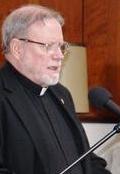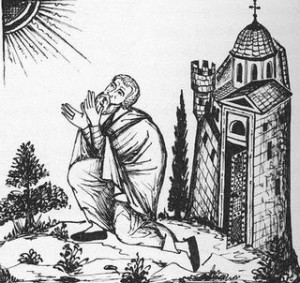by Fr. Patrick Henry Reardon
 Senior Editor of Touchstone Magazine, and archpriest of All Saints Orthodox Church in Chicago, IL, Fr. Patrick is, perhaps, the most erudite writer in the Orthodox Church in North America today. This article, one of his Pastoral Ponderings, was published by Orthodoxtoday.org.
Senior Editor of Touchstone Magazine, and archpriest of All Saints Orthodox Church in Chicago, IL, Fr. Patrick is, perhaps, the most erudite writer in the Orthodox Church in North America today. This article, one of his Pastoral Ponderings, was published by Orthodoxtoday.org.
Publican and Pharisee
The Lord’s account of the two men who
“went up to the temple to pray” (Luke 18:9-14)
may be said to illustrate three characteristics of Christian Prayer.
It shows such prayer to be
- theologically structured,
- persistent, and
- pure.
First, the prayer is theologically structured. Jesus tells us that this Publican
“went up to the Temple to pray.”
He could have prayed anywhere, we suppose. He might have gone out into the woods, for instance. Some folks have told me, over the years, that they don’t come to church on Sunday because they find it more comfortable to pray out in the woods, or in the privacy of the home, or on the beach, or perhaps on the golf course. We presume that this Publican could have done the same, but he chose to make a special trip to the Temple, a particular house set apart for the purpose of worship.
That is to say, the Publican gave a determined theological structure to his prayer.
It may have been the case that this Publican went up to the Temple at one of the special times for prayer, such as the ninth hour, when the evening sacrifice was being offered. Thus, the Acts of the Apostles tells us,
“Peter and John went up together to the temple to pray at the hour of prayer, the ninth hour.”
 This time of the evening sacrifice was a favored time of prayer. One of the Psalms recited at that hour contained the lines,
This time of the evening sacrifice was a favored time of prayer. One of the Psalms recited at that hour contained the lines,
“Let my prayer be set before You as incense, The lifting up of my hands as the evening sacrifice.”
Jews observed this evening hour of prayer throughout the whole world, uniting their hearts and minds in communion with the evening sacrifice taking place in the Temple. Thus, in the Book of Acts we find the Centurion Cornelius observing that same ninth hour of prayer.
When Cornelius became a Christian, did he stop observing that daily discipline of evening prayer? Of course not. Indeed, he and the other converts carried it right over into the Christian Church as the canonical hour of Vespers, which we have continued, in an unbroken tradition, to the present day. It is instructive to observe that Vespers invariably contains the lines,
“Let my prayer be set before You as incense, The lifting up of my hands as the evening sacrifice.”
Or perhaps the Publican went up to the Temple to pray at the third hour, the time of the morning sacrifice. That too was a standard time of daily prayer for Jews throughout the world, who united their hearts and minds with the morning sacrifice being offered in the Temple. This third hour, we recall, was the time at which the Holy Spirit descended on a group of Jews gathered in the upper room on the first day of the week.
Those Jews, when they became Christians, did not stop that daily discipline of prayer at the time of the morning sacrifice. It passed over into the Christian Church as the canonical hour of Orthros or Matins, which we have observed ever since. Vespers and Matins are older than any other part of our daily liturgical format; they are older than the Christian Church.
Or it may be the case that the Publican went up at some other time during the day, a time dictated solely by his personal preference. It makes no difference. The important thing to observe is that he made his prayer in the Temple. That is to say, he gave his prayer a defined theological structure. His prayer was not a purely private devotion. It was offered within a theological context, because the Temple was an institution of theological history.
The Publican’s prayer was rendered in the setting of an “organized religion.” It found its proper frame of reference in an ongoing community of shared faith and binding address. His prayer was situated within salvation history. It expressed his identity as a child of Abraham and an heir of the covenant. He prayed in continuity with Moses and the prophets. In prayer his soul was united to David, the author of the Psalms.
The Publican’s prayer was an expression of his very identity.
Second, the Publican’s prayer was persistent. Jesus tells us that this Publican
“standing afar off, would not so much as raise his eyes to heaven, but beat his breast, saying, ‘God, be merciful to me a sinner!’”
Luke uses here the imperfect verb etypten, which literally means,
“he kept on beating his breast.”
The Publican was not afraid to repeat himself in his prayers.
Luke also uses the imperfect tense in two other scenes of prayer in chapter 18 of his Gospel. Thus, in describing the cry of the widow in the parable that comes just before this one, Luke says that when this lady came to the judge’s house, she cried out repeatedly. Similarly, later in this same chapter of Luke, we read of the blind man of Jericho, who kept on crying out to Jesus as He walked along the road. These were all repeated prayers.
The Publican’s “Lord, have mercy” was prayed many, many times. He was not content with just once. His prayer was persistent. He would give God no rest.
Persistent prayer tends, in short, to be repetitious prayer. This is a perfectly biblical style, in spite of a strange modern bias against repetition in prayer. Apparently it was this somewhat recent bias that caused the translators of the King James Bible to mistranslate the Greek word polylogia (“wordiness”) as “vain repetition” (Matthew 6:7). Repetition in prayer, however, is exactly what we find in these stories in the Gospel, where petition takes the form of repetition. There is nothing “vain” about it.
Third, the Publican’s prayer was pure. It was a simple pleading for the divine mercy, a prayer of humility and repentance. In short, it was a pure prayer. Unlike the Pharisee in this parable, the Publican passed no judgment on anyone else. Knowing himself to be a sinner, he was not the least bit disposed to think of himself as better than others.
Pure prayer is humble and repentant. It is not self-righteous. It is not puffed up and self-satisfied. Pure prayer does not seek its own fulfillment. A man that prays with spiritual purity stands in stark contrast to those who pray in order to find some sort of spiritual lift or personal satisfaction.
We don’t know if the Publican felt spiritually fulfilled by his prayer. In fact, we surmise that perhaps he didn’t. We suspect that he felt just as miserable after his prayer as he did before. He was no less a sinner for having admitted to being a sinner. When he left the Temple that day, we may presume that he was not content or happy with himself. None of that has anything to do with the purity of prayer.
No, purity in prayer means that the prayer is unselfish. It is not prayer made for the sake of some spiritual experience or devotional high. These qualities are not essential to prayer. Indeed, they may serve in some cases as nothing better than distractions. What is important in prayer is its purity. Pure prayer is unselfish prayer.
The Publican’s prayer represented the gift of himself to God. True, it was a poor gift, because he was a sinner, and he knew it. Yet, according to Jesus,
“this man went down to his house justified rather than the other; for everyone who exalts himself will be humbled, and he who humbles himself will be exalted.”
Such is the prayer of the man who is justified through faith, not by his own merits. His prayer is pure because it is based solely in the mercy of God.
This is the prayer that Jesus teaches in the parable of the Publican.
